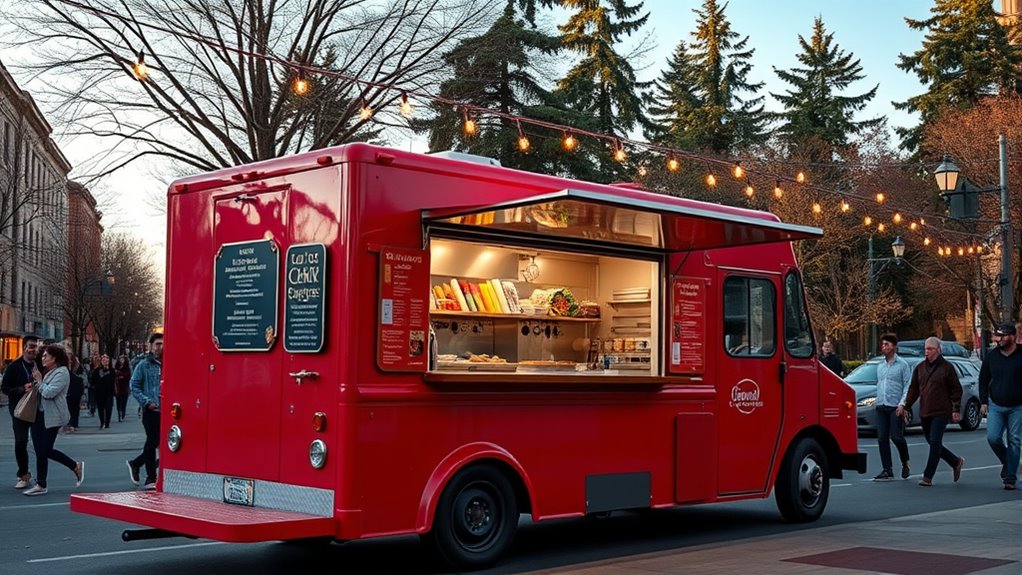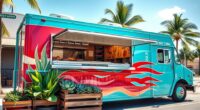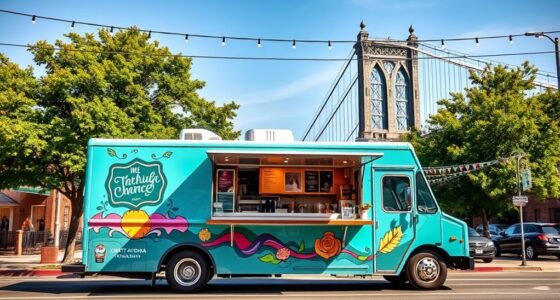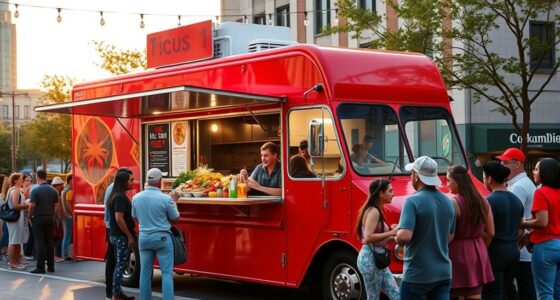To start a food truck in Vancouver, WA, you need to focus on local food trends by sourcing fresh, regional ingredients and engaging with community events to stand out. Make sure to complete all permits, meet health and parking regulations, and secure the right licenses. Design a menu that highlights Pacific Northwest flavors and use technology for efficient operations. Keep building your brand through community involvement, and you’ll find plenty more tips to help you succeed as you explore further.
Key Takeaways
- Complete Vancouver’s online permit application and ensure compliance with health, parking, and licensing regulations.
- Secure a shared kitchen license, design an efficient layout, and budget for vehicle purchase and ongoing expenses.
- Incorporate local Pacific Northwest ingredients and regional flavors into your menu to attract community interest.
- Implement contactless payments and real-time inventory management to streamline operations and reduce waste.
- Engage with local events, support community causes, and use social media to build brand loyalty and grow your customer base.
Fresh Local Food Trends
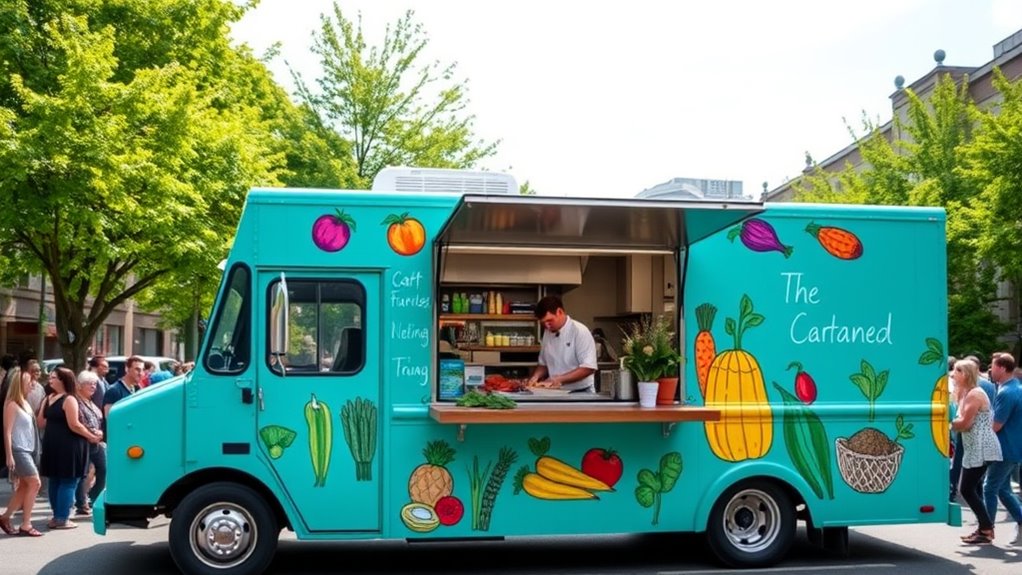
Fresh, local food is more than just a trend—it’s a movement reshaping how Vancouver, WA, residents dine out. As a food truck owner, you can tap into these local food trends by prioritizing fresh ingredients in your menu. Customers today seek authentic flavors made from ingredients sourced nearby, supporting local farmers and producers. Incorporating seasonal produce and locally raised meats not only ensures quality but also appeals to eco-conscious diners. Staying current with these trends helps your food truck stand out in a competitive market. By emphasizing fresh, locally sourced ingredients, you create a connection with your community, boost your reputation, and meet the growing demand for sustainable, healthy options. Additionally, understanding local food trends can guide you in crafting a menu that resonates with your customers’ preferences and values. This approach keeps your offerings relevant and aligns with the values of Vancouver’s vibrant food scene.
Understanding Local Requirements
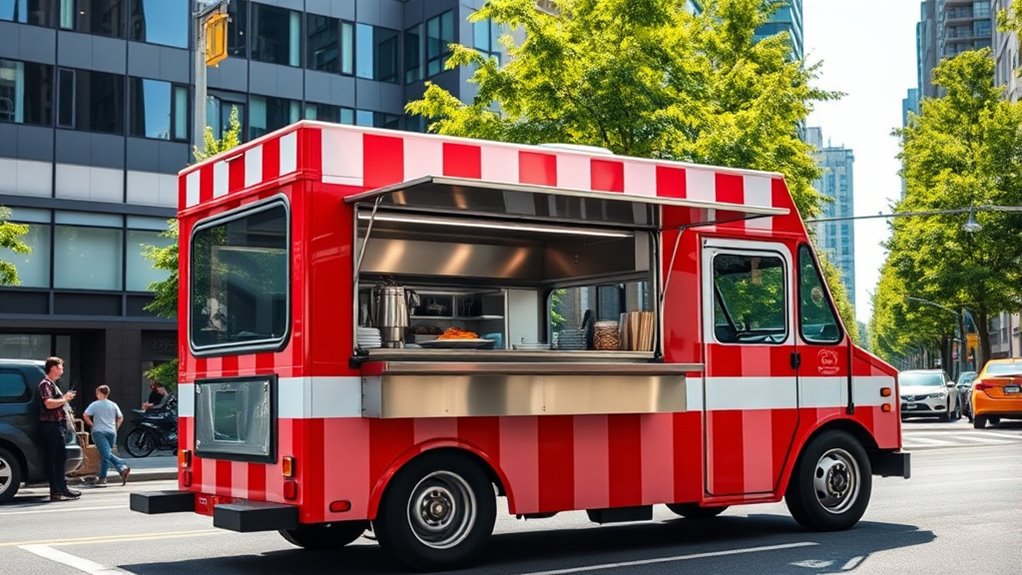
To get started, you’ll need to complete the online permit application and review the health inspection checklist to guarantee your truck meets local standards. It’s also important to familiarize yourself with designated parking zones for food trucks to stay compliant. Taking these steps early helps you avoid delays and set a solid foundation for your business. Additionally, understanding local licensing requirements can help ensure your food truck operates legally from the start.
Online Permit Application Process
Guiding the online permit application process in Vancouver, WA, requires understanding the city’s specific requirements and procedures. To successfully navigate the permit process, you’ll need to complete the online application accurately. Here are key steps to keep in mind:
- Gather all necessary documents before starting your online application.
- Review Vancouver’s specific permit requirements to ensure compliance.
- Submit your application through the city’s official portal to avoid delays.
- Track your application status regularly and respond promptly to any requests.
Health Inspection Checklist Overview
Understanding the local health inspection requirements is essential for your food truck’s success in Vancouver, WA. To pass inspections, you must meet specific standards that ensure food safety and hygiene. The checklist covers key areas like safe food handling, proper storage, sanitation, and equipment maintenance. Familiarize yourself with these to avoid violations and delays. Here’s a quick overview:
| Area | Requirements | Notes |
|---|---|---|
| Food Handling | Use gloves, avoid cross-contamination | Maintain personal hygiene |
| Storage | Keep raw and cooked foods separate, proper temperature control | Regularly monitor temperatures |
| Sanitation | Clean and sanitize surfaces and utensils regularly | Use approved cleaning agents |
| Equipment | Ensure proper operation and maintenance of all appliances | Regular inspections recommended |
Designated Parking Zones for Trucks
Knowing where you can legally park your food truck is essential to operating smoothly in Vancouver, WA. Local parking regulations specify designated truck zones where trucks are allowed to park, helping you avoid fines or violations. These zones are often found near popular areas like downtown or event venues but may have restrictions on hours or duration. To stay compliant, familiarize yourself with the city’s rules. Key points include:
- Clearly marked truck zones for food trucks
- Time restrictions in certain areas
- Parking permits required in some zones
- Restrictions against parking in residential or restricted zones
Setting Up Your Base of Operations
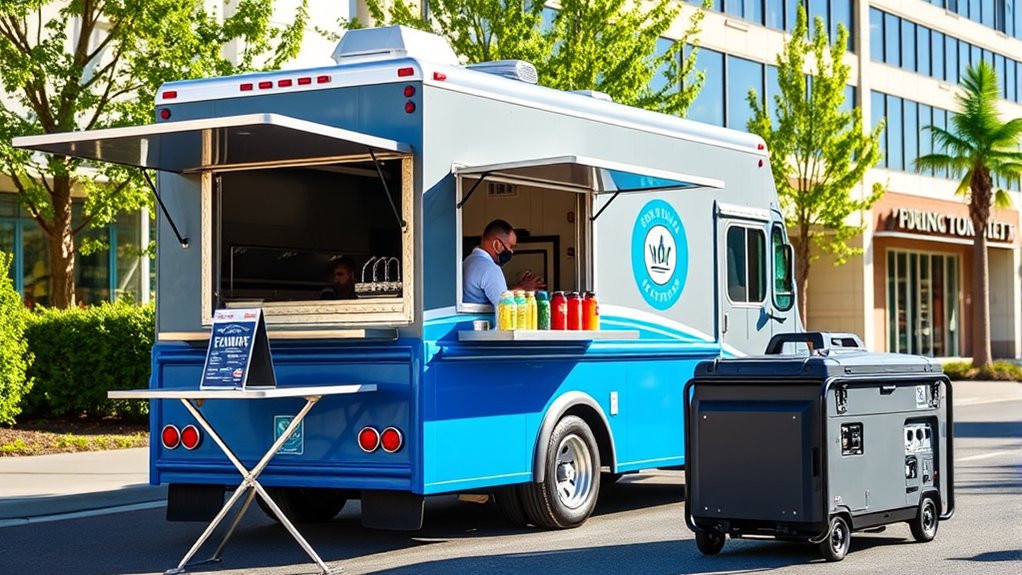
Setting up your base of operations starts with understanding shared kitchen licensing requirements in Vancouver, WA, to guarantee you meet local health and safety standards. Next, you’ll need to plan a custom kitchen layout that maximizes efficiency and complies with regulations. By addressing these points, you’ll create a solid foundation for your food truck business. Additionally, considering self-watering planters for any on-site greenery or garden areas can help maintain plants with minimal effort and ensure freshness in your offerings.
Shared Kitchen Licensing Requirements
To operate a food truck in Vancouver, WA, you’ll need to secure a shared kitchen license that meets local health and safety standards. This shared kitchen licensing guarantees your food prep space complies with legal requirements, helping you avoid fines or shutdowns. When choosing a shared kitchen, verify it meets all necessary health inspections and safety protocols.
Consider these key factors:
- Proper sanitation and cleanliness practices
- Adequate storage for ingredients and equipment
- Certified food handler staff on-site
- Regular health inspections and documentation
Ensuring your shared kitchen adheres to these standards guarantees legal compliance and smooth operation. Don’t overlook this step; it’s essential for establishing a legitimate, safe base of operations for your food truck business.
Custom Kitchen Layout Planning
After securing your shared kitchen license, it’s time to design a custom layout that maximizes efficiency and safety. A well-planned custom kitchen design streamlines workflow, reducing unnecessary movement and boosting productivity. Focus on layout efficiency by placing equipment logically: prep stations near cooking zones, sinks close to cleaning areas, and storage within easy reach. Consider your menu and how ingredients flow through each stage. Use this table to visualize your space:
| Zone | Equipment Needed | Key Consideration |
|---|---|---|
| Prep Area | Cutting boards, knives | Space for multiple prep tasks |
| Cooking Zone | Stoves, fryers | Ventilation and safety |
| Cleaning Station | Dishwasher, sinks | Easy access, water supply |
| Storage | Shelves, refrigerators | Organized and accessible |
| Service Window | Counter, display cases | Quick customer service |
Designing your custom kitchen layout guarantees smooth operations and layout efficiency.
Budgeting and Financing Your Food Truck

Before launching your food truck, you need to plan your budget carefully. Consider the initial costs of purchasing your vehicle, explore local small business grants, and account for liability and payroll expenses. Getting these financial details right will set a solid foundation for your business’s success. Additionally, researching best cologne options for personal branding can help you present a professional image as you grow your business.
Initial Vehicle Purchase Costs
Purchasing your food truck is a substantial upfront investment that requires careful budgeting and financing planning. Expect costs to vary based on whether you buy new or used, with used trucks often being more budget-friendly but potentially needing upgrades. Keep in mind vehicle depreciation, which reduces your truck’s value over time, and insurance premiums, which can markedly impact your ongoing expenses. To help you plan, consider these factors:
- Cost of the vehicle itself
- Insurance premiums for coverage
- Estimated vehicle depreciation
- Financing options available
Local Small Business Grants
Securing local small business grants can substantially ease the financial burden of starting your food truck in Vancouver, WA. Local business grants offer valuable startup funding that doesn’t require repayment, helping you cover costs like permits, equipment, or initial inventory. To find these grants, research resources like the Vancouver Chamber of Commerce or regional economic development agencies that support small businesses. Keep in mind, applying for grants often involves a competitive process and detailed proposals, so be prepared to showcase your business plan and community impact. Taking advantage of local grant opportunities can boost your startup budget, reduce reliance on loans, and increase your chances of launching successfully. Stay proactive in seeking out grants, and you’ll have a better shot at turning your food truck dream into reality.
Liability and Payroll Requirements
Understanding liability and payroll requirements is essential for budgeting and financing your food truck in Vancouver, WA. Securing liability insurance protects you from potential lawsuits and damages, ensuring your business stays afloat. You’ll also need to manage payroll taxes, which include Social Security, Medicare, and unemployment contributions—these are crucial for legal compliance. To stay on track, consider:
- Estimating insurance costs for liability coverage
- Calculating payroll taxes accurately
- Budgeting for employee wages and benefits
- Staying updated on local labor laws
Designing Your Menu and Pricing Strategy
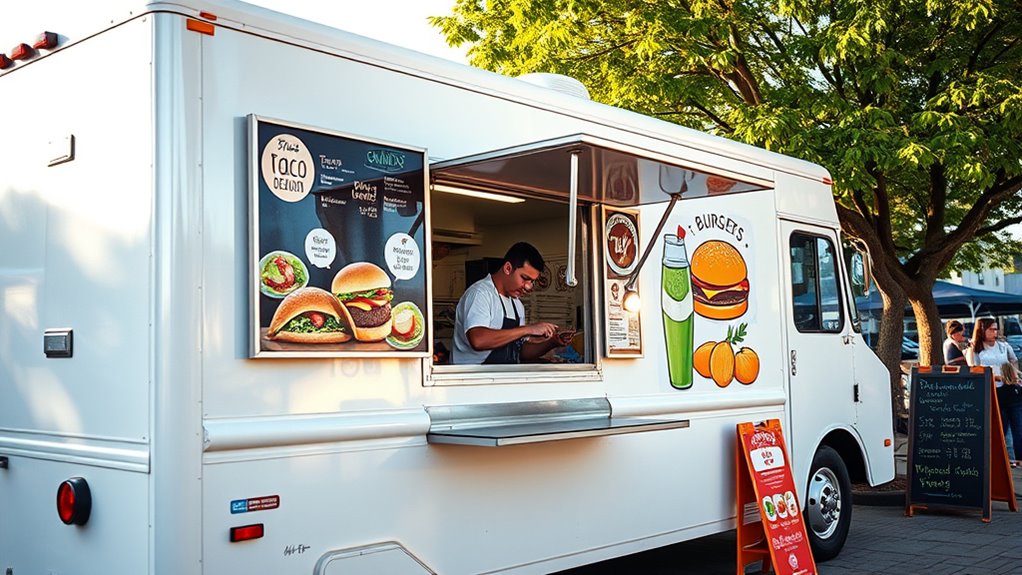
When designing your menu, focus on incorporating local flavors that resonate with Vancouver’s community to attract customers. You’ll also want to carefully manage ingredient costs by sourcing seasonal and bulk items to maximize your profits. Balancing unique offerings with cost-effective choices sets the foundation for a successful pricing strategy. Additionally, understanding the juice yield from citrus fruits can help you accurately price drinks and reduce waste.
Locally Inspired Menu Curation
Creating a locally inspired menu for your Vancouver, WA food truck involves selecting dishes that highlight regional flavors and ingredients, which helps attract customers seeking authentic experiences. Focus on regional flavor curation to develop a menu that resonates with your community. To craft your menu, consider these essential steps:
- Incorporate local ingredients like berries, salmon, or hazelnuts to emphasize regional flavor.
- Offer signature dishes inspired by Pacific Northwest cuisine.
- Balance traditional favorites with innovative creations.
- Price items competitively while reflecting ingredient quality and effort.
Ingredient Cost Optimization Techniques
Designing your menu and pricing strategy with ingredient cost optimization in mind guarantees your food truck stays profitable while offering appealing dishes. Focus on ingredient sourcing to find quality items at lower prices without sacrificing flavor. Bulk purchasing and establishing relationships with local suppliers can help control costs and ensure consistent quality. Keep your menu simple by emphasizing versatile ingredients that can be used across multiple dishes, reducing waste and expenses. Price your menu carefully, accounting for ingredient costs to maintain healthy profit margins. Regularly review your costs and adjust recipes or sourcing strategies as needed. By actively managing ingredient sourcing and practicing cost control, you can maximize profitability while delivering delicious, well-priced meals that keep customers coming back.
Technology and Operations
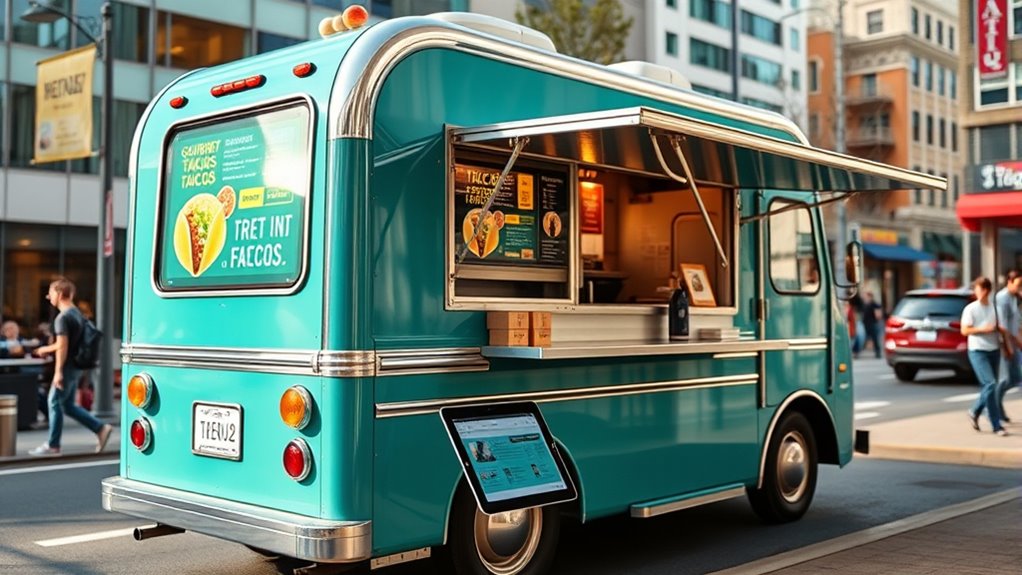
Implementing contactless card payments makes transactions quicker and safer for your customers. Using real-time stock tracking software helps you manage inventory efficiently and avoid shortages. Embracing these technologies keeps your food truck running smoothly and enhances customer satisfaction.
Contactless Card Payment Options
Adopting contactless card payment options can streamline your food truck’s transactions and enhance customer convenience. With contactless payments, customers can pay quickly using their smartphones or tap-and-go cards, reducing wait times and improving satisfaction. You’ll want to explore various card reader options that support contactless payments to find the best fit for your setup. Consider these key features:
- Compatibility with multiple payment methods
- Easy integration with existing POS systems
- Robust security features
- Portable and durable design
Choosing the right card reader options ensures smooth transactions during busy hours and builds trust with your customers. Implementing contactless payments not only modernizes your business but also simplifies operations and increases sales potential.
Real-Time Stock Tracking Software
To keep your food truck running smoothly, real-time stock tracking software is essential for managing inventory efficiently. With this technology, you can monitor your stock levels continuously, preventing shortages and overstocking. It simplifies inventory management by automatically updating quantities as you use or sell ingredients, ensuring accurate data at all times. This helps you plan for order fulfillment effectively, avoiding delays that could impact customer satisfaction. Plus, real-time insights allow you to reorder supplies promptly, reducing waste and controlling costs. Implementing this software streamlines operations, saves time, and keeps your inventory organized. Ultimately, it empowers you to focus on delivering quality food and excellent service, knowing your stock levels are always up to date and in control.
Marketing and Growing Your Presence
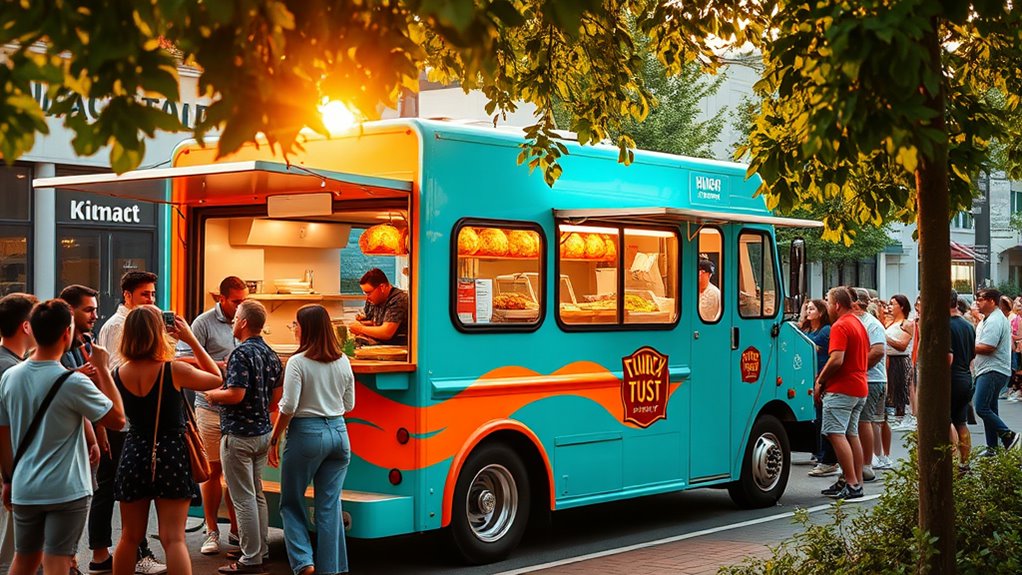
To boost your visibility, start by scheduling your appearances at popular local events and food festivals. These gatherings are perfect for connecting with new customers and building your reputation. Consistently engaging at these venues will help grow your presence and attract loyal fans.
Popular Event Scheduling Tips
Scheduling your events strategically is essential for building a strong presence in Vancouver, WA. Thoughtful event scheduling ensures you maximize customer flow and boost visibility. To do this effectively:
- Pick peak times when foot traffic is highest to increase sales.
- Avoid competing with major local events to stand out.
- Rotate locations to reach different neighborhoods and demographics.
- Use local calendars to identify community events that align with your food offerings.
Local Food Festivals Engagement
Participating in local food festivals offers a prime opportunity to boost your food truck’s visibility and attract new customers. Use this chance to strengthen your food truck branding by showcasing your unique menu and engaging with festival-goers. Share your participation through social media campaigns before, during, and after the event to maximize exposure. Post high-quality photos, behind-the-scenes videos, and customer testimonials to create buzz and encourage visits. Consider offering special festival-only menu items or promotions to draw attention. Engaging actively on social media helps build a loyal following and keeps your truck top of mind. Remember, consistent messaging and authentic interaction at festivals will grow your presence and establish your brand within the Vancouver, WA community.
Community Engagement Boosts Sales
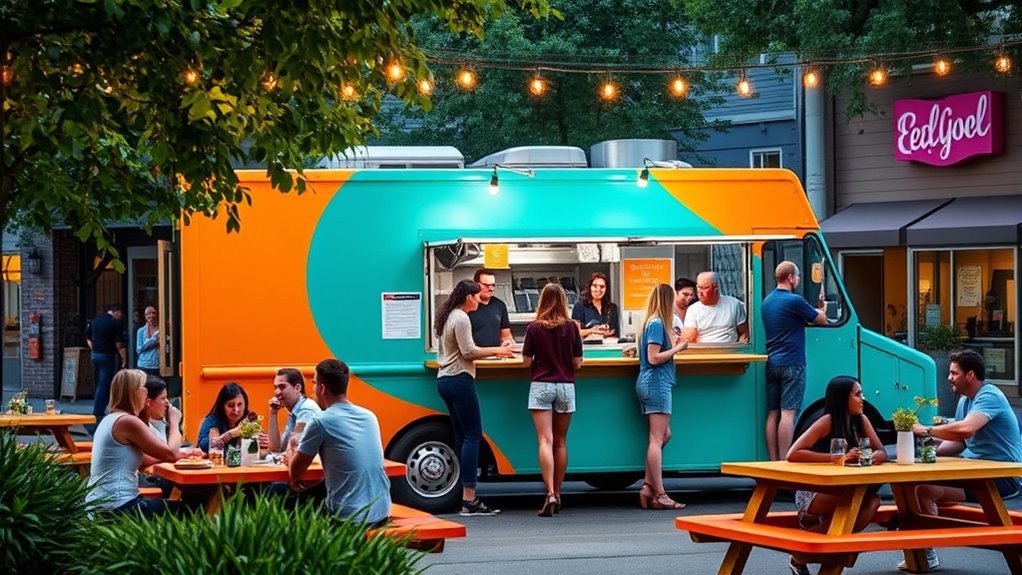
Engaging with the Vancouver community can considerably boost your food truck’s sales by building loyal customers and increasing visibility. Strong community ties enhance your food truck branding and foster customer loyalty. To connect effectively, consider:
- Participating in local events and markets
- Supporting community causes or charities
- Collaborating with other local businesses
- Creating social media campaigns highlighting community stories
These actions show you care about Vancouver residents, making your brand more relatable and trusted. When customers see your genuine involvement, they’re more likely to return regularly. Consistent community engagement helps you stand out amid competition and turns first-time visitors into loyal supporters. Ultimately, active participation in local life fuels sales growth and cements your food truck’s reputation as a valued part of Vancouver’s vibrant scene.
Frequently Asked Questions
What Permits Are Required Specifically for Food Trucks in Vancouver, WA?
You need to obtain food truck licensing and health department permits to operate legally in Vancouver, WA. First, apply for a mobile food unit license through the Vancouver Health Department, which involves passing a health inspection. Then, secure a business license from the city. Make sure to meet all local regulations, including fire safety and parking permits, to keep your food truck compliant and ready to serve customers.
How Do I Find Reliable Suppliers for Local Ingredients?
You find reliable local suppliers for ingredient sourcing by connecting directly with local farmers through farmers’ markets, community-supported agriculture (CSA) programs, and online directories. Visit local farms to establish relationships, ask for recommendations, and guarantee quality. Joining Vancouver’s food co-ops or industry associations can also help you discover trusted sources. Building strong partnerships with local farmers ensures fresh, sustainable ingredients for your food truck menu.
What Are Common Challenges Faced by New Food Truck Owners?
As a new food truck owner, you’ll face challenges like setting accurate menu pricing to stay competitive and guarantee profitability. Balancing food costs, managing a tight schedule, and attracting loyal customers can be tough. To succeed, focus on consistent quality, engaging with your community, and offering unique menu items. Building strong customer relationships helps with retention, making it easier to navigate the ups and downs of your food truck journey.
How Can I Effectively Navigate Vancouver’s Parking Regulations?
Did you know Vancouver has over 200 designated parking zones? To navigate parking regulations effectively, stay informed about local parking enforcement and zone restrictions. Always check posted signs before parking your food truck to avoid fines or towing. Consider establishing relationships with local authorities and parking lot owners. Using apps or websites that map parking zones can also help you find legal spots quickly, ensuring smooth daily operations.
What Are the Best Times and Events for Food Truck Sales?
You should target food truck festivals and seasonal sales opportunities to maximize sales. Attend popular local events like Vancouver’s summer festivals and holiday markets, which draw large crowds. Weekends and evenings are prime times for high foot traffic, especially during events. Planning around seasonal festivals ensures you tap into busy periods, boosting your sales and visibility in Vancouver. Be flexible and ready to adapt to event schedules for ideal success.
Conclusion
Starting a food truck in Vancouver, WA, might just be your ticket to becoming the next culinary legend. With fresh local food trends and community support, you’ll turn heads and fill stomachs faster than you can say “food truck revolution.” Jump in, embrace the adventure, and watch your tiny mobile kitchen transform into a bustling empire—because in Vancouver, your food truck dreams could explode into a flavor-filled phenomenon that everyone can’t stop talking about!
